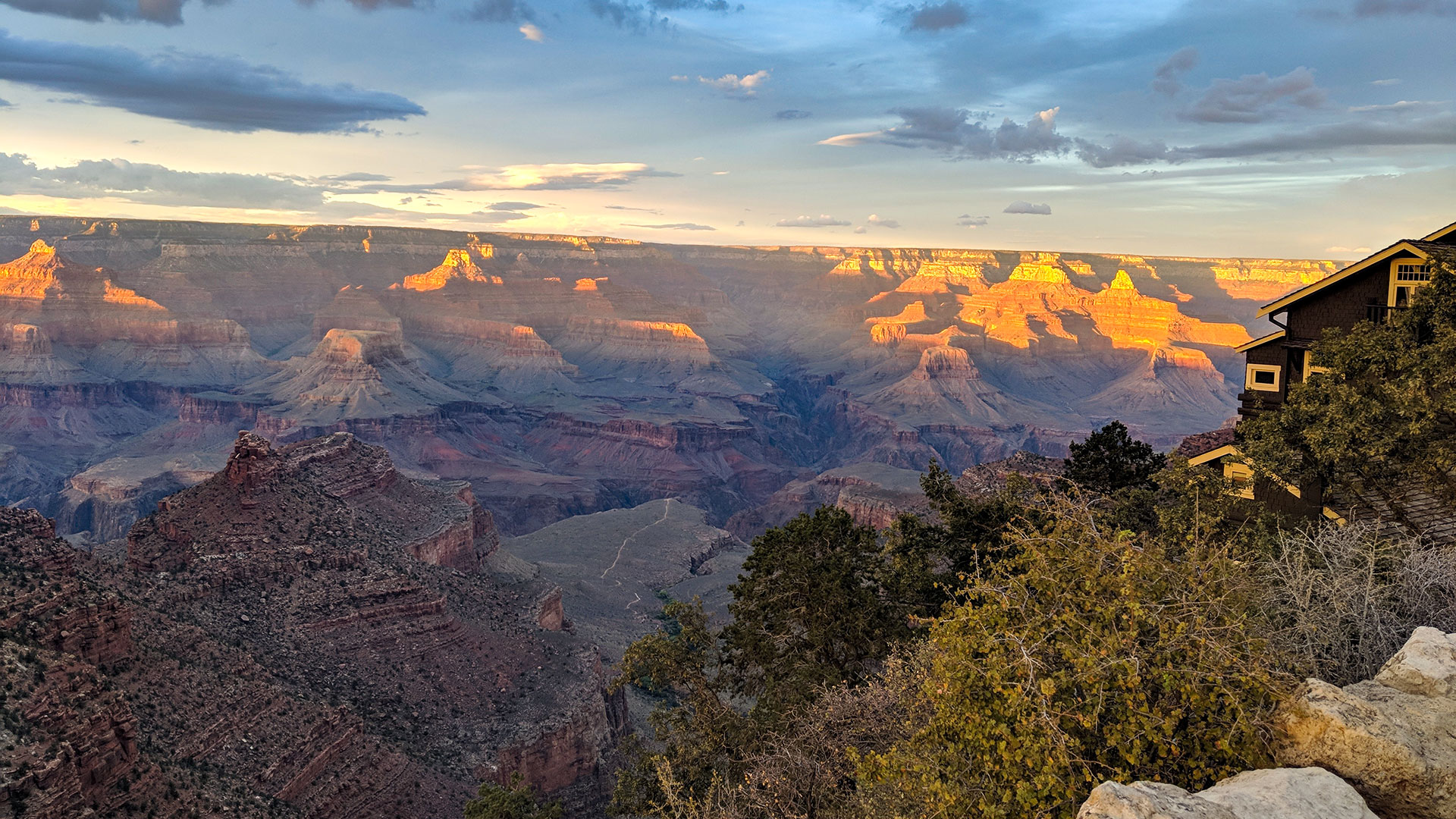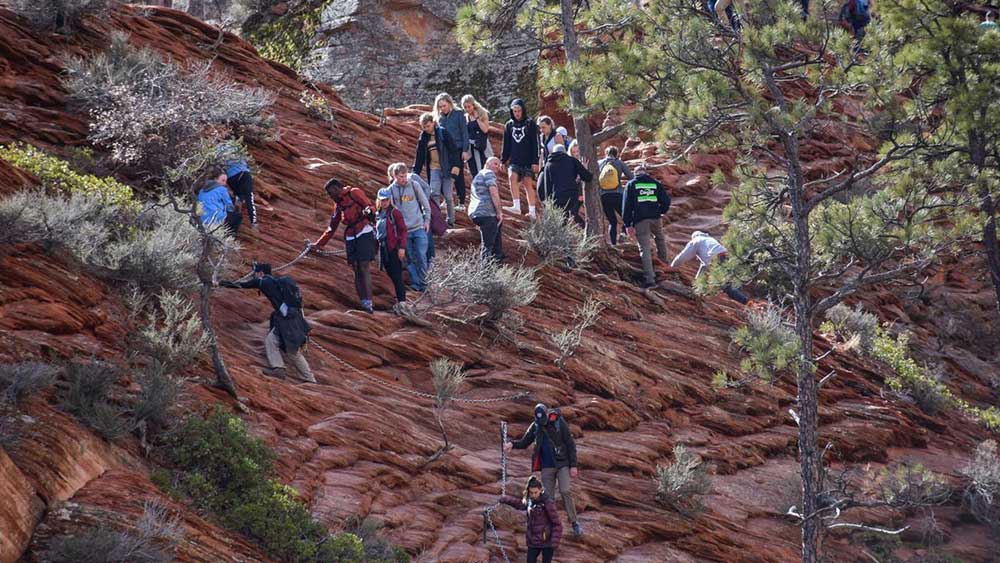 A view from the South Rim of the Grand Canyon, next to the Kolb Studio, September 2018.
A view from the South Rim of the Grand Canyon, next to the Kolb Studio, September 2018.
UPDATE: The National Parks Service announced after the initial publication of this story Wednesday that it was closing Grand Canyon National Park.
TEMPE – Arizona lawmakers joined local and tribal officials Tuesday calling on the Interior Department to reverse its “reckless” decision to keep Grand Canyon National Park open during the COVID-19 pandemic.
Park lodging and concession services were stopped two weeks ago by coronavirus fears, but the National Park Service at that time waived park entry fees “to make it easier for the American public to enjoy the outdoors.”
Democratic Reps. Raul Grijalva of Tucson, Tom O’Halleran of Sedona and Rep. Ruben Gallego of Phoenix joined seven other House members who wrote Interior Secretary David Bernhardt Tuesday to say keeping the park open puts workers and visitors both at risk. Their letter said that the park superintendent’s request to close the park had been denied.
“By ignoring park management and key local stakeholders, it appears that you have chosen to play politics with the health and safety of the American public,” the letter said.
Grand Canyon National Park officials did not respond to requests this week for comment. The National Park Service said in a statement Monday it has not yet made a decision on whether to close the park.
“Discussions and evaluations of park conditions and operations remain ongoing, using the decision factors the NPS has been consistently applying to all operations,” the statement said.
An internal memo to employees of the park said a call from the Grand Canyon’s acting superintendent for closing the park was supported by the director and regional director of the National Park Service.
 VIEW LARGER Despite notices that people should maintain safe distances to prevent the spread of the coronavirus, even in the outdoors, critics of the National Park Service decision to keep many parks open say that is not happening. This photo dated March 21 shows hikers clustered together on Angels Landing at Zion National Park in Utah.
VIEW LARGER Despite notices that people should maintain safe distances to prevent the spread of the coronavirus, even in the outdoors, critics of the National Park Service decision to keep many parks open say that is not happening. This photo dated March 21 shows hikers clustered together on Angels Landing at Zion National Park in Utah. Tim Whitehouse, executive director of Public Employees for Environmental Responsibility, said his organization is hearing complaints from park staff about “leaderless direction” from the National Park Service. Park staff have also said they have been instructed not to talk about COVID-19 publicly, he said.
“There seems to be no leadership in the National Park Service about the issue of COVID-19,” Whitehouse said. “There seems to be no understanding that the national parks need to be shut down.”
The lawmakers’ letter follows calls by Navajo Nation and Coconino County to close the park in the face of the coronavirus, and comes as the first case of COVID-19 was confirmed in nearby Grand Canyon Village.
The Navajo had reported 148 confirmed coronavirus cases and five deaths as of Monday, while Coconino County had 81 confirmed cases of the disease as of Tuesday.
The letter to Bernhardt said that because many national parks are located in rural areas, like Coconino County, a COVID-19 outbreak could easily overwhelm local hospitals.
“Warnings on the National Park Service website and the closure of some park facilities have not proven sufficient to protect public health, prompting grave concerns from federal employees and the local communities nearest our public lands,” the letter reads.
In recent days, the park has modified its operations in response to the coronavirus pandemic, closing campgrounds, hotels, tours, visitor centers, museums, shuttles and river trips among other changes.
Currently, a market, a bank, a post office window, a cafe, a clinic and a self-serve gas station are the services that remain open in some capacity.
While county officials have called for the park’s closing, city officials in Tusayan – which sits at the entrance to the park – said Tuesday they have not taken an official stance.
In nearby Williams, City Manager Chase Waggoner said the Williams Visitor Center has seen less than a third of the patrons this month than it saw in March 2019. Visitors have fallen from 350 on an average day to about 20 per day now.
“You can just see the tourists aren’t there,” Waggoner said. “Now we have a handful of people from Phoenix and Albuquerque and that’s it.”
Whitehouse said the main concern is that areas around parks could become COVID-19 hot spots “because of the inability of the National Park Service to act decisively to shut these parks down.”
“This poses potentially great consequences for the community in the area and the families of park rangers that have to staff these parks,” he said.
Gallego on Tuesday called the decision to keep the park open “reckless.”
“Secretary Bernhardt must take immediate action to fight this pandemic on our public lands, including by closing Grand Canyon National Park,” Gallego said in a statement from his office. “Closing Grand Canyon National Park will save lives, period.”
For more stories from Cronkite News, visit cronkitenews.azpbs.org.

By submitting your comments, you hereby give AZPM the right to post your comments and potentially use them in any other form of media operated by this institution.